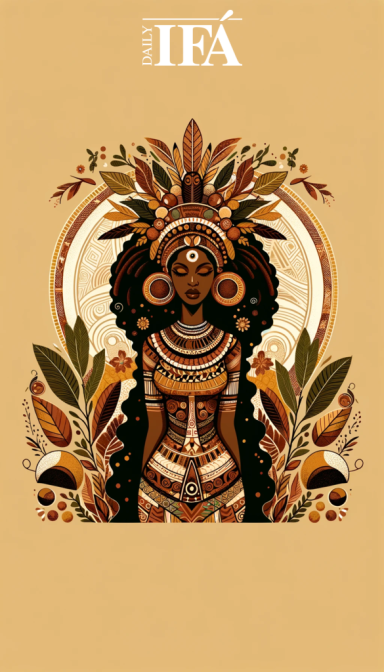
About ORISHÀ OBÁ
The Orishá of Marriage, Endurance, and Rivers in Yoruba and Santería Religions. Obá, an Orishá in the Yoruba and Santería religions, is a multifaceted deity with profound influences and associations. She is one of the wives of Shango and embodies various aspects of femininity and strength.
Obá's influence in a person's life is profound and diverse. She embodies the virtues of marital fidelity, the nurturing power of the river, and the strength of feminine endurance. As a guardian of morality and protector of wives, her presence offers guidance and support in maintaining harmonious marital relationships. Her association with hard work and self-sacrifice underscores the importance of dedication in both personal and professional realms. In the face of betrayal and sorrow, Obá offers consolation and the strength to overcome adversity, making her a powerful figure of resilience and fortitude in the Yoruba, Candomblé and Santería faiths.
About the ORISHÁ
Roles and
Influence
- Goddess of Marriage and Domesticity: Obá is revered as the epitome of marital fidelity and domestic virtues, embodying the values of marriage and home life.
- Goddess of the River: Like other female orishas, Obá is associated with the river, symbolizing the nurturing aspect of water and life-giving forces.
- Symbol of Female Endurance: Known for her endurance and strength in mythology, Obá is a symbol of female resilience.
- Patroness of Women: As a goddess of marriage and symbol of endurance, she is viewed as a patroness of women, particularly married women.
- Guardian of Feminine Morality: Obá represents virtues such as fidelity, patience, and fortitude, guarding feminine morality.
- Protector of Wives: Invoked as a protector of wives and the sanctity of marriage, Obá stands as a guardian figure in marital relationships.
- Goddess of Hard Work and Labor: She symbolizes the dedication involved in maintaining a household and caring for a family.
- Symbol of Self-Sacrifice: Often portrayed as self-sacrificing in myths, Obá is willing to endure hardship for her loved ones.
- Representative of Betrayal and Vengeance: Some myths depict her experiences of betrayal and her quest for vengeance, symbolizing the pain caused by betrayal.
- Goddess of Sorrow and Consolation: Known for her trials and suffering, Obá is also a goddess of consolation, offering strength in adversity.
Characteristics and Symbolism
- Symbols: Obá is represented by a sword, fan, bow and arrow, shield, and copper bow and arrow.
- Colors: Her colors are yellow, red, and brown, signifying various aspects of her nature.
- Natural Places: Raging rivers are significant to Obá, reflecting her connection to turbulent waters.
- Stones: Garnet, emerald, coral, tiger's eye, and ivory are stones associated with her.
- Metal: Copper is a metal linked to Obá.
- Health: She is connected to health issues related to hearing, the ear, and the throat.
- Weekday: Wednesday is her designated day.
- Element: Fire, raging rivers, battle, and war are elements associated with her.
- Animals/Offerings: Offerings to Obá include goat, chicken, guinea fowl, duck, and specific plants and foods like Ocimum basilicum, Dracaena, and Amalá.
- Syncretism: She is syncretized with St. Joan of Arc in some traditions.
- Commemoration Day: May 30th and 31st are days dedicated to her commemoration.
Key Manifestations (Aspects)
Obá (Obbá) manifests in various forms, including
- Obá Gideô
- Obá Lodê
- Obá Lokê
- Obá Lomyin
- Obá Syió
- Obá Terá
Sign-Up for free to your Weekly Newsletter.
Illustrations of the Orishá
Wir benötigen Ihre Zustimmung zum Laden der Übersetzungen
Wir nutzen einen Drittanbieter-Service, um den Inhalt der Website zu übersetzen, der möglicherweise Daten über Ihre Aktivitäten sammelt. Bitte prüfen Sie die Details und akzeptieren Sie den Dienst, um die Übersetzungen zu sehen.




